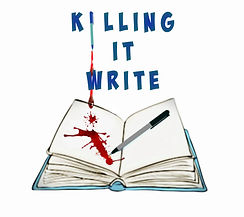IS HEAD-HOPPING REALLY SO AWFUL?
- Gina

- Mar 25, 2021
- 3 min read
Updated: Aug 31, 2025
Have you ever been told your head-hopping is a problem, and you just can’t understand why? You like the way your prose reads and don’t want to change it? After all, Susan can’t understand how she came to be running so late, and the reader simply needs to know what she’s thinking, even though we’re right in the middle of a heated argument between Prudence and Paul.
Paul thinks Prudence is being a little too free with her wares and wants her to go home and change out of that slinky, low-cut dress. “Good golly, woman, your breasts are nearly exposed!”
Prudence isn’t having it. No one tells her what she can and can’t wear. This is an important event, and it’s her favorite dress or nothing. Hmm… Perhaps I should come back wearing nothing at all. See what Paul thinks of that!
But Susan doesn't have time for their drama, so, ignoring the couple, she hurries past them to push through the double doors with a roll of her eyes.
Okay… What?
Exactly. Who cares about Susan and her tardiness? We want to know if Prudence will dare to come out wearing nothing at all. Come to think of it, who is Susan, and why should we care what she thinks about anything?
But let’s backtrack a moment, and for those of you who may not quite understand what the term head-hopping means, head-hopping is when you have an uncontrolled narrative. This is when the point of view (POV) randomly switches from one character’s head to another within the same scene. (See my example above.)
When a writer does this “head-hop” within a single sentence, and only there, then jumps right back to the same POV he or she started with, I call that a POV violation. It’s still technically a head-hop, and confusing or distracting to your reader. And confusing your reader is precisely what head-hopping does. It's no different than changing the subject in the middle of a discussion without warning, then after a few sentences jumping to another. This is never a good idea. After all, we work so hard to pull our readers into our books, so why yank them right back out again?
This common writing mistake is most often found when writing in third-person POV, but not always. As an editor, I find the occasional head-hop in just about every manuscript that comes past my desk, even with those writing in first-person POV, although there it is typically in the form of a POV violation, as I just described above.
Now, you may be asking, "What's the big deal?" but believe me, it is a big deal. Never underestimate just how damaging this error can be because it is an error, no matter how well-known an author you might be. The smallest things can jolt a reader out of your story; a typo, a missing word, a missing punctuation mark… Even something like a dialogue tag that comes too late can be a game-changer. That small error will have the reader hearing the wrong voice in their head, and that jolts a reader out of the story as they now have to backtrack and read that passage again with the correct voice in their head before moving on.
And just so you know how serious I am, I'll repeat: switching POV in the middle of a paragraph or even in the midst of a scene can be quite confusing, which results in pulling your reader momentarily out of your story.
In my example at the start of this post, even if we take Susan out of the equation, your reader thinks you’re in Paul’s POV during this argument, but then suddenly you’re telling the reader what Prudence is thinking, and that has the reader stopping and saying, “Wait. What?”
It may only pull them out for a moment, but when these distractions occur, again and again, your reader will get frustrated, and that frustration can easily lead to them giving up, closing your book, and saying, “It’s not worth it.”
So do yourself a favor and don’t distract your reader. After all, I have faith that you’re putting a lot into this story you’re creating. You’ve been honing your writing skills and working on multiplying those story-crafting brain cells, learning more and more about how to pull the reader right inside the pages of your book. (You have, right?)
And after all of that hard work, wouldn’t you rather keep your readers there right from the start and on through to the end?
I know I would.








Comments